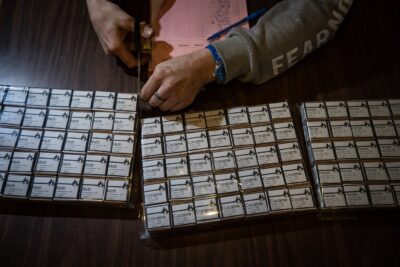Stopping overdoses like bailing a boat with a thimble, B.C. court hears
By Canadian Press on November 24, 2025.

VANCOUVER — The co-founder of a Vancouver “compassion club” that bought heroin, cocaine and methamphetamine so it could be tested and sold to save lives said he wanted to stop the dangerous street drugs from killing people.
“It’s like you’re trying to bail out a boat with a thimble,” Jeremy Kalicum told a B.C. Supreme Court Monday, describing the crisis where he would see hundreds of overdoses.
Kalicum was testifying on the first day of a constitutional challenge after he and Eris Nyx, the other co-founder of the Drug User Liberation Front, were convicted of possession of drugs for the purpose of trafficking.
The convictions earlier this month have been suspended until the constitutional argument is decided.
Their lawyers say the criminal charges that shut down the compassion club, violated the Charter rights of people looking to use its tested drugs instead of those of the risky street market.
Kalicum told the court of his years of work in harm reduction starting in 2016, including setting up an overdose prevention site in Naniamo, working at the Insite safe injection site in Vancouver’s Downtown Eastside and being hired by Vancouver Coastal Health to test drugs for safety.
Kalicum, who has a master’s degree in public health, said the driver of overdose deaths is the unpredictability of the drug supply and that there wasn’t a tangible response from the government to address the root of the issue.
In 2021, he and Nyx Incorporated the Drug User Liberation Front and applied to Health Canada for an exemption to Canada’s drug laws that would allow them to run a compassion club that tests and sells drugs at cost to a small group of users to track its effectiveness.
He said they originally wanted to work with a pharmaceutical company to get the drugs but that didn’t materialize.
Kalicum described a lengthy process of attempting to get Health Canada to grant an exemption, repeatedly reminding officials in letters that “people were dying.”
Health Canada rejected the application, saying DULF’s plan presented too many public health and safety risks. The group went ahead with the dark web plan anyway, believing it would save lives, he said.
Their lawyer Tim Dickson told the court in his opening statement on Monday that the risk from the street supply of drugs is “grossly disproportionate” to any benefit of shutting down the club.
“The Drug User Liberation Front, its compassion club was an efficacious means of reducing the severe risks of overdose, injury and death arising from the toxic drug crisis,” Dickson said as dozens of the organizations’ supporters watched from the gallery.
Dickson said the closure of the club violates users’ Section 7 rights to life and security of the person and their Section 15 rights to equality on the grounds of disability — in this case severe addiction.
He said Section 7 is engaged when the actions of the state increase the risk of death for a person, either directly or indirectly, and that the Charter guarantees that people have control over their bodily integrity, free from state interference.
Dickson told the court the charges were “completely out of sync” with the public health goals of Canada’s drug laws and the club was effective in reducing overdoses and deaths.
Closing the club “removes an urgently needed harm-reduction mechanism, and it subjects the members to the risk of overdose, injury or death or criminal,” he said calling it “inconsistent with the equal worth and protection of people who use drugs.”
The hearing is expected to last about three weeks, and Dickson said it will include testimony from multiple experts.
They are asking the court to either grant a stay of proceeding on the drug charges or an exemption as a result of the Charter violations.
DULF had operated the compassion club between August 2022 and October 2023, and was given annual funding of $200,000 from the Vancouver Coastal Health authority for its drug checking and overdose prevention services.
Dickson said he will show that an exemption to the federal law was not “practically available” to the club because of a series of bureaucratic and legislative barriers.
The operation triggered political criticism, particularly after it emerged that the club had initially received the public funding.
The operation was shut down when police conducted a raid and arrested Kalicum and Nyx.
Justice Catherine Murray says in her decision released Nov. 7 that the issue at trial was whether drug law exemptions granted to DULF allowed them to possess the drugs with the intent to sell them.
Murray acknowledged that DULF was founded in response to the toxic drug crisis with the goal of distributing safe drugs and curbing overdose deaths.
The decision says the exemption authorized Kalicum and Nyx to test the drugs, package and label them, and provide supervised consumption of those substances, but it did not extend to selling the tested drugs to members.
Statistics from the BC Coroners Service says 1,384 people died of unregulated drugs in the province up until the end of September.
This report by The Canadian Press was first published Nov. 24, 2025.
Ashley Joannou, The Canadian Press
-31

